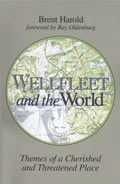Wellfleet and the World
Themes of a Cherished and Threatened Place
From the introduction:
Much of my experience of this place over the years, like that of many washashores, has been pure romance. "Washashore" is what natives in these parts call non-native residents. There are worse things to be called than washashore. You could be, and most of us were earlier in our evolution, a "summer complaint", the old term for varieties of summer people, part-time residents, summer renters, tourists and creatures still lower in the local hierarchy. In the big picture, washashore status is something of an achievement. Nevertheless there is in the term a bit of insult, an implication that, like the flotsam, jetsam, and driftwood that wash up on the beach, you occupy marginal space and might just wash away on the next tide.
***With our move here ten years ago the honeymoon begun in 1959 in a tent on the beach was over. My education in the reality of small towns, this small town, began. I think at first in some fuzzy way I thought that by choosing to live fulltime in this town we would be getting an even stronger dose of the romance of our part-time experience—isn't that too often the motive for marriage: Fulltime access to the charms of the beloved? Real life here has of course proved otherwise.
Raising a child in a place is one sure cure for the disease of romance. Since we live only a third of a mile down a beautiful sand road from the elementary school, we imagined that our five year old, who started kindergarten the very week we moved, would walk every day down the sand road to school-perhaps, in season, barefoot, like Tom Sawyer; and surely the local teachers, being Wellfleet teachers, would approve. As it turned out he never once made that walk, barefoot or not. Refusing from the start to cooperate with our romantic vision, he chose to walk up to the paved road to catch the bus for that two-minute ride, his motives bodily ease and social opportunity.
Contents
Foreword by Ray Oldenburg
Introduction: Confessions of a Washashore
'94
'95
'96
'97
'98
|
'99
'00
'01
'02
|
Reviews
"Brent Harold writes about his adopted town with uncommon wit and
literary grace. Though the issues and principles that Harold writes
about in Wellfleet and the World are local, the behavior and
principles they shed light upon broadly reflect the current American
condition."
—Robert Finch, author, The Cape Itself and Death of a Hornet and
Other Cape Cod Essays
"Consider what San Francisco's Herb Caen, Chicago's Mike Royko and New
York's Joseph Mitchell did for their towns. Out on the farther reaches
of the Cape, Brent Harold demonstrates that civic journalism is as vital
to small towns as it is to large cities."
—Ray Oldenburg, author, The Great Good Place
"In Wellfleet and the World, Brent Harold paints a charming portrait
of a charming little town on the sea... His book will make the
expression 'washashore' familiar and enticing to many readers...a
good read for all seasons."
—Howard Zinn, author, A People's History of the United States


